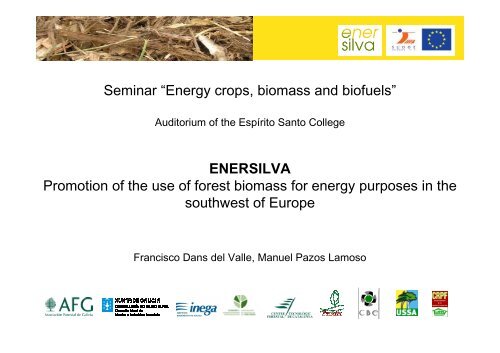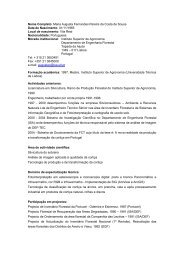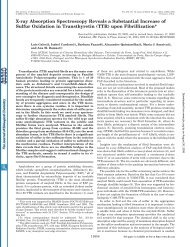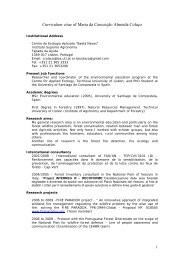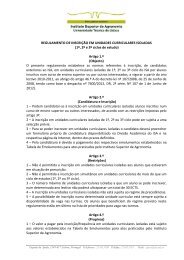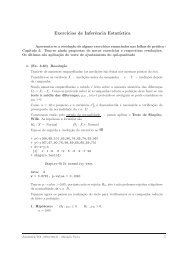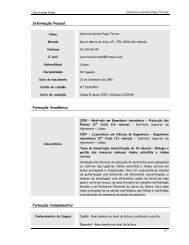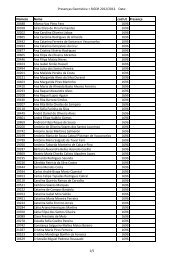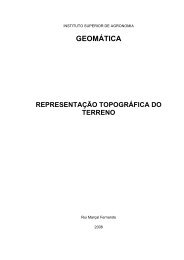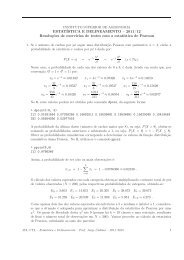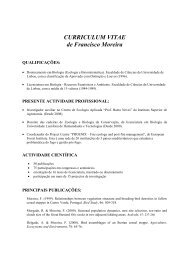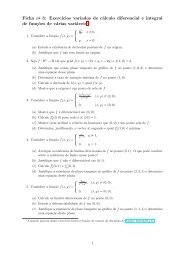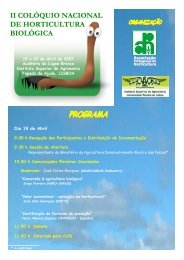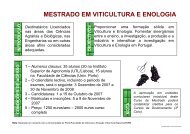Seminar “Energy crops, biomass and biofuels” ENERSILVA ...
Seminar “Energy crops, biomass and biofuels” ENERSILVA ...
Seminar “Energy crops, biomass and biofuels” ENERSILVA ...
You also want an ePaper? Increase the reach of your titles
YUMPU automatically turns print PDFs into web optimized ePapers that Google loves.
<strong>Seminar</strong> <strong>“Energy</strong> <strong>crops</strong>, <strong>biomass</strong> <strong>and</strong> <strong>biofuels”</strong>Auditorium of the Espírito Santo College<strong>ENERSILVA</strong>Promotion of the use of forest <strong>biomass</strong> for energy purposes in thesouthwest of EuropeFrancisco Dans del Valle, Manuel Pazos Lamoso
The projectProgramme: Interreg III B SudoeField: 6 regions of Spain, France <strong>and</strong> Portugal with the cultivatedforest more productive of Europe, 90% forest private propertyObject: promotion of the energy use of primary forest <strong>biomass</strong>Initiative: forest owners of the south of EuropeTerm: two years <strong>and</strong> a half 2004-2007Budget: 1.000.000 €FEDER: 623.000 €
Enersilva partnersForest owners organizationsAsociación Forestal de GaliciaConfederación de Forestalistas del País VascoAssociação Florestal de Portugal-ForestisUnion des Syndicats de Sylviculteurs d’AquitaineForest AdministrationsConsellería Medio Rural. Dirección Xeral de Montes de GaliciaCentre Régional de la Propriété Forestière d’AquitaineEnergy Agencies <strong>and</strong> R&D CentreInstituto Enerxético de GaliciaCentre Tecnològic Forestal de CatalunyaCentro da Biomassa para a Energia de Portugal
Enersilva partners
Objectives <strong>and</strong> activitiesForest owners’ dinamization: PFB circuit, identification of forestowners’ organizational models <strong>and</strong> PFB mobilizationSupport of local initiatives: promotion <strong>and</strong> mentoring of forest owners’local initiatives.PFB uses: techniques <strong>and</strong> elaboration of production costsRules <strong>and</strong> energy <strong>and</strong> forest policies: countries-regions comparedanalysis, collaboration with relevant authorities, proposal ofincentivesPlanning: regional possibilities of plants <strong>and</strong> energy installations’developmentSocial <strong>and</strong> environmental impact: quantifying of generatedemployment <strong>and</strong> impact in the decrease of forest firesFormation: forest owners <strong>and</strong> professionalsCommunication <strong>and</strong> broadcasting: Enersilva web, presence inevents, press <strong>and</strong> technical articles
Primary forest <strong>biomass</strong> BFPDefinitionNeed of defining PFB properly <strong>and</strong> of using a common terminology.PFB: Biodegradable fraction of the products generated in the forests <strong>and</strong> thatare processed for energy purposes.In the case of cultivated forests of the south of Europe, the primary forest<strong>biomass</strong> consist mainly of vegetal materials from cultural treatments <strong>and</strong>from wood residues.Origin of primary forest <strong>biomass</strong>– Pruning, thinning, shoot selection,….– Residues from cuttings: branches <strong>and</strong> end pieces– Fuelwood– Forest energy <strong>crops</strong>– (Brushing out of brushwood)
PFB Pinus pinaster, Galicia
PFB eucalyptus, Galicia
PFB pine, Catalonia
PFB chestnut, Dordogne
PFB eucalyptus, Portugal
Forest energy <strong>crops</strong>, Galicia
Current situation- 6 mill of tonnes of PFB in the area without valorisation- 1 electric power plant, Mortágua-Portugal- Low development of the pellets market- Very scarce implementation of heating networks- Absence of data <strong>and</strong> information on the resource- Absence of specific subsidies for the resource’smobilization- Dissuasive campaign of the wood industry- Lack of objective information for the decision makers<strong>and</strong> the general public- Scarce communication between the energy <strong>and</strong> forestpolicies’ responsible persons
Problems in the forests of SW Europe• overproduction of forest <strong>biomass</strong> in the forests• low consume of forest products• high costs of cultural treatments• high risk of forest fire• increasing impact of pathologies• deficient forest infrastructures• increasing social dem<strong>and</strong>s on forests• low incomes of the foresters• desertification of the rural environment
PFB costs estimationCOSTSCOUNTRIES€/t a 35% humiditySpainFrancePortugalSW UEPFB generation12-2618-3012-2212-30PFB H<strong>and</strong>ling In the forest13-6035-6013-4013-60PFB Transport to the plant11-178-207-187-20Commercial profit (15%)5-159-175-125-17PFB cost in plant41-11870-12737-9237-127PFB generation: costs for the forest owner in order to produce <strong>biomass</strong>. It includes % of reforestation costs<strong>and</strong> of forest management expensesPFB use in the forest: costs assigned to the labours of PFB harvest <strong>and</strong> splinteringPFB transport: transport costs, mainly splinter, from the forest to the plant, average distance 30 km
PFB costs estimationConclusionsOnce analysed the theoretical PFB costs in the different regions, they werecompared with the prices that nowadays are paid in the consumer center.From this comparison, one can establish the following remarks:• The PFB current prices only cover the h<strong>and</strong>ling costs –exploitation +transport-, they do not cover the costs of generation that, nonetheless, areassumed by the forest owner.• The PFB price assigned to electric energy generation is 50% cheaper thanthe price of wood assigned to cellulose paste for paper <strong>and</strong> 35% cheaperthan the price assigned to industrial fibreboard.• The PFB current price assigned to heat production in the SW Europe isvery competitive in front of the conventional fossil fuels.• In some forest areas with difficult orography conditions, the <strong>biomass</strong> pricesthe operators can pay will not cover the BFP costs <strong>and</strong>, consequently, thereshould exist public subsidies for its mobilization.
Electric power plants of PFBSCENARY 2012 SW EUROPECurrentplantsPlants beingcarried outPlants inprospect2012/plants2012/MWGalicia1-111270BasqueCountry0-2220Catalonia01128,5Aquitaine0-2222Portugal121114260Other regions017890Total SW EU243440470,5
Electricity production from PFB in SWEuropeElectric MW50045040035030025020015010050010 1265470,52000 2005 2007 2012MW eléctricos
PFB consume for electric power plantsin SW EuropeBFP in tonnes of green matterx10 6 tonnes54,5432Mill. toneladas11,10,180,202000 2005 2007 2012
Collaboration in rulesRoyal Decree on production of electric energy in special regime, staterule that regulates in Spain the prices of green electricity generatedfrom PFB <strong>and</strong> the requirements of the electric power plantsRural Development Plan of Portugal, strategic measures for the forests ofPortugalRural Development Plan of Galicia, strategic measures for the GalicianforestsRegulation of the installations of electricity production from PFB inGaliciaTechnical Plan on the energetic use of forest <strong>biomass</strong> of Galicia
Formation• Three international seminars: 350 experts.Forest <strong>biomass</strong>, energy <strong>and</strong> rural development. Porto (Portugal)Heating networks <strong>and</strong> forest <strong>biomass</strong>. Périgueux (France)Forest <strong>biomass</strong> <strong>and</strong> green electricity. Vigo (Spain)• Speeches <strong>and</strong> communications in congresses, scientific forum,36 speeches or communications in scientific forum of Spain, France<strong>and</strong> Portugal.• Twenty courses <strong>and</strong> local seminars, more than 700 forest ownersinvolved.• Nine technical meetings: 280 participants, experts <strong>and</strong> forest owners
Communication <strong>and</strong> broadcasting• www.enersilva.org:12.000 visits• Fairs <strong>and</strong> events:• Expobioenergía. Valladolid,Spain• Green Week. Brussels, Belgium• International Fair Semana Verdede Galicia. Lalín, Spain.• Fimapa-Ferralia, Exponor.Oporto, Portugal.• Expoflorestal. Aveiro, Portugal.• Enersilva leafletPresentation of the project infour languages. 30.000 units• Publication of the projectEnersilva in three languages.10.000 units
Conclusions on the PFB mobilization(I)• There is plenty of resource in SW Europe <strong>and</strong> its exploitation is verynecessary in order to ensure the forest sustainability• The prices of the PFB for the forest owner should cover the costs ofproduction plus a business benefit. This will allow to invert inorganization <strong>and</strong> logistics in order to reduce the exploitation costs• In some territories of SW Europe the market will not be able to cover thegeneration PFB exploitation costs. It will be necessary to turn to publicsubsidies. This is very frequent in zones of high risk of forest fire• It is compulsory <strong>and</strong> urgent to h<strong>and</strong>le a clear <strong>and</strong> common terminologyon <strong>biomass</strong> <strong>and</strong> also to use precise <strong>and</strong> objective measure unities
Conclusions on the PFB mobilization(II)• There is plenty of resource in SW Europe <strong>and</strong> its exploitation is verynecessary in order to ensure the forest sustainability• The prices of the PFB for the forest owner should cover the costs ofproduction plus a business benefit• Plants <strong>and</strong> centres de supply very close to the forests• Adaptation of the structure of the woodl<strong>and</strong> in the forests• Optimization of the cultural treatments• Adaptation of the systems of clear cutting <strong>and</strong> timber extraction• Infrastructures of storage <strong>and</strong> timber extraction in the forests• Methods <strong>and</strong> installations of measurement <strong>and</strong> control of the origin <strong>and</strong>traceability of PFB• Instruments of information <strong>and</strong> market monitoring• R+D+i in order to improve the energetic efficiency• R+D+i in order to adapt the forest energetic <strong>crops</strong>
ASOCIACIÓN FORESTAL DE GALICIARúa do Vilar nº 33 1º. CP 15.705. Santiago de Compostela. Galicia. SpainTelf. 0034.981.564.011asforgal@iies.esThanks for your attentionFrancisco Dans del Valle(fdans@selga.es)Manuel Pazos Lamoso(mpazos@selga.es)


